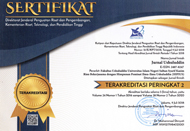Reactualizing Classical Islamic Power: Reinterpreting Al-Mawardi in Post-Reform Indonesian Democracy
Abstract
Keywords
Full Text:
PDFReferences
Abdillah, Masykuri. “Religion and State Relations in the Context of Political Modernization in the Reformation Era.” Ahkam 13, no. 2 (2013). https://journal.uinjkt.ac.id/index.php/ahkam/article/view/937/823.
Adi, Gunawan Saputra, Suryadi, and Rozikin Mochammad. “Application Of Syura In Public Leadership (Study at Madrasah Aliyah Negeri 3 Malang)." Journal of Public Administration (JAP) 2, no. 2 (2011): 257–63.
Al-Mawardi. Al-Ahkam As-Sulthaniyah. Edited by M. Yusuf Musa. Yogyakarta: Pustaka LSI, 1991.
Amin, Muhammad. “Al-Mawardi's Political Thought." Journal of Prophetic Politics 4, no. 2 (2016): 117–36. https://doi.org/10.24252/jpp.v4i2.2744.
An-Na’im, Abdullahi Ahmed. Islam and the Negotiating the Future of Shari’a. Cambridge: Harvard University Press, 2008.
Ansari, Sajid Mahmood. “Al-Mawardi’s Theory of Imamate.” issp.edu.pk, 2023. https://issp.edu.pk/2023/05/27/al-mawardis-theory-of-imamate/.
Aspinall, Edward, and Ward Berenschot. Democracy for Sale: Elections, Clientelism, and the State of in Indonesia. New York: Cornell University Press, 2019.
Bhat, Adil Hussain. “Apprehending Al- Mawardi’s Theory of Imamate.” International Journal of Humanities & Social Science Studies (IJHSSS) IX, no. II (2023): 42–52. https://doi.org/10.29032/ijhsss.v9.i2.2023.42-52.
Bland, Ben. “Politics in Indonesia: Resilient Elections, Defective Democracy.” Lowy Institute for International Policy, no. April (2019): 24. https://www.lowyinstitute.org/sites/default/files/Bland_Politics in Indonesia_WEB_0.pdf.
Defrizal, Mgs A, Achmad Zulham, and Solihin. “Democracy in Islam: A Review of Maudhu'i Interpretation.” Wardah 21, no. 2 (2020): 66–79.
Diana, Rashda, Siswanto Masruri, and Surwandono Surwandono. “Political Ethics in Perspective Al-Mawardi.” Tsaqafah 14, no. 2 (2018): 363. https://doi.org/10.21111/tsaqafah.v14i2.2433.
Elyati, Eni. “Muslim Intellectual Thought in the Social Sphere: The Concept of the State in Political Thought Al-Farabi, Al-Mawardi, Ibn Khaldun” 5, no. 2 (2024): 498–507.
Farady, Gianta. “The Evolution of Indonesian Democracy: From Soeharto's New Order to Post-Reform Challenges.” ppimalaysia.or.id, 2024. https://ppimalaysia.or.id/evolusi-demokrasi-indonesia-dari-orde-baru-soeharto-ke-tantangan-pasca-reformasi/.
Fikhriyah, Roidatul. “Al-Mawardi’s Perspective on The Concept of State and Leadership in Islam During The Classical Period.” Rewang Rencang: Lex Generalis Law Journal 6, no. 2 (2025): 102–16.
Hanif, David. “Analysis of Fiqh Siyasah on Khilafah According to Al-Mawardi in the Book of Al-Ahkam As-Shulthaniyyah.” Jurnal Lex Renaissance 7, no. 1 (2022): 153–66. https://doi.org/10.20885/jlr.vol7.iss1.art12.
Hosen, Nadirsyah. “Religious Pluralism, Inclusive Secularism, and Democratic Constitutionalism.” In Muslim Secular Democracy, edited by Lily Zubaidah Rahim. Palgrave Macmillan, 2013. https://doi.org/https://doi.org/10.1057/9781137282057_10.
Madjid, Nurcholish. Islam Religion of Humanity; Building Tradition and New Vision of Indonesian Islam. Jakarta: Yayasan Wakap Paramadina, 1995.
Mietzner, Marcus. “Indonesia’s Democratic Stagnation: Anti-Reformist Elites and Resilient Civil Society.” Democratization 19, no. 2 (2011). https://doi.org/doi:10.1080/13510347.2011.572620.
Mustafa, Mustafa. “Al Mawardi’s Thoughts on the Welfare State in the 1998-2019 Reform Era in Indonesia.” International Journal of Islamic Thought and Humanities 1, no. 1 (2022): 66–93. https://doi.org/10.54298/ijith.v1i1.39.
Mutalib, Mahazan Abdul, and Ahmad Rafiki. The Role of Islamic Spirituality in the Management and Leadership Process. New York: IGI Global Scientific Publishing, 2021. https://doi.org/DOI: 10.4018/978-1-7998-6892-7.
Noor, Erla S. P., Ahmadi Hasan, and Masyithah Umar. “Democracy in Indonesia Realizing People's Sovereignty.” Indonesian Journal of Islamic Jurisprudence, Economic and Legal Theory 1, no. 4 (2023): 679–93. https://doi.org/10.62976/ijijel.v1i4.196.
Putra, Bayu Karunia, Azizatul Farhaini, Dinatul Aini, Siti Nurjannah, Noviana, Iza Martha Padila, Nanik Azizah, and Husnul Maab. “Relevance of Islamic Political Thought According to Al-Mawardi in Indonesia.” Scientific Journal of Wahana Education 9, no. 18 (2023): 827–42. http://jurnal.peneliti.net/index.php/JIWP/article/view/5887.
Putra, Gilang Rizki Aji. “Reform in Indonesia and its Effect on Political Islam.” ’Adalah 4, no. 2 (2020): 79–86. https://doi.org/10.15408/adalah.v4i2.16490.
Rachid, Ghannouchi. Al-Hurriyat Al-‘Ammah Fi Al-Dawlah Al-Islamiyah. Beirut: Arab Unity Studies Center, 1993.
Rachman, Zaky Umar. “The Role of Democratic Pillars in Enhancing National Resilience Amidst the Challenges of Globalization.” Amendment: Indonesian Journal of Defense Science, Politics and Law 2, no. 1 (2025): 38–46.
Rahayu, Kurnia Yunita. “24 Years After Reform, Indonesia's Democracy Is Still Vulnerable.” kompas.id, 2022. https://www.kompas.id/baca/polhuk/2022/05/20/24-tahun-pasca-reformasi-demokrasi-indonesia-masih-rentan.
Rosenthal, E.I.J. Political Thought in Medieval Islam: An Introductory Outline. London: Cambridge University Press, 1962.
Sachedina, Abdulaziz. The Islamic Roots of Democratic Pluralism. Oxford: Oxford University Press, 2001.
Sujatmiko, Iwan Gardono. Political Reform and Popular Sovereignty. Jakarta: Simposium Universitas Indonesia, 1998.
Syamsuddin, Din. “The Search for the Concept of the State in the History of Islamic Thought.” Ulumul Quran 4, no. 2 (1991).
Syamsuddin, M. Din. “Between the Powerful and the Powerful: Reflections on Islamic Political Thought and Practice.” Al-Jami’ah: Journal of Islamic Studies 39, no. 1 (2001): 152–73.
Syarwi, Pangi. “Issue Polarization, Identity Politics and Public Divide in the 2019 Presidential Election.” Jurnal Communitarian 4, no. 1 (2022): 591–602. https://doi.org/10.56985/jc.v4i1.228.
Tibi, Bassam. Political Islam, World Politics and Europe: Democratic Peace and Euro-Islam versus Global Jihad (1st Ed.). London: Routledge, 2007.
Wahib, Abd Hadi. “Islam and the Challenge of Democratization in Indonesia.” Nusantara; Journal for Southeast Asian Islamic Studies 16, no. 1 (2020): 32. https://doi.org/10.24014/nusantara.v16i1.10650.
Wahyudi, Johan, and Makmun Wahid. “Minority Marginalization and the Absence of Multiculturalism in the Local Domain (Case Study of Shia Muslim Community in Sampang).” JPP (Jurnal Politik Profetik) 3, no. 1 (2015): 65–81. http://journal.uin-alauddin.ac.id/index.php/jpp/article/view/823.
Warren, Mark E. Accountability and Democracy. Oxford: Oxford University Press, 2014.
Widyatma, Zulfikar Yoga. “The Concept of Leadership According to Al-Mawardi." Ijtihad : Journal of Islamic Law and Economics 8, no. 1 (2014): 87–103.
Zainuddin. “Islam and Democracy.” uin-malang.ac.id, 2013. https://uinmalang.ac.id/r/131101/islam-dan-demokrasi.html.
DOI: http://dx.doi.org/10.24014/jush.v33i1.36559
Refbacks
- There are currently no refbacks.
 Jurnal Ushuluddin Indexed By:
Jurnal Ushuluddin Indexed By:
Alamat Redaksi:
 Fakultas Ushuluddin UIN SUSKA Riau Jl. H.R. Soebrantas KM. 15,5 Panam – Pekanbaru
Fakultas Ushuluddin UIN SUSKA Riau Jl. H.R. Soebrantas KM. 15,5 Panam – Pekanbaru
 E-mail: jurnal.ushuluddin@uin-suska.ac.id
E-mail: jurnal.ushuluddin@uin-suska.ac.id
ejournal: http://ejournal.uin-suska.ac.id/index.php/ushuludin

Jurnal Ushuluddin is licensed under a Lisensi Creative Commons Atribusi 4.0 Internasional.

















